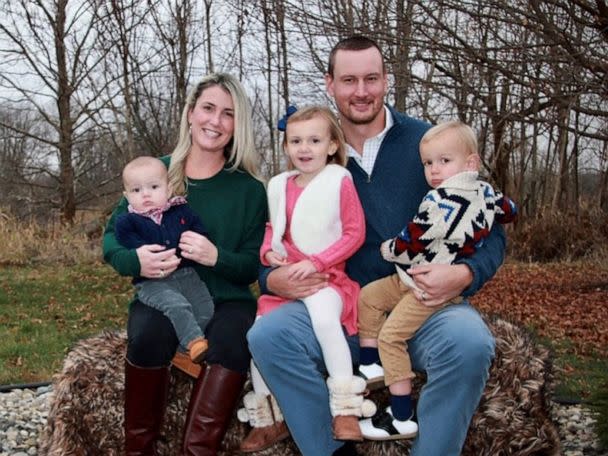Kristyn Watkins had her first menstrual cycle when she was 10 years old and then suffered for almost the next three decades from what she describes as debilitating, heavy periods.
“As a young child I thought it was normal to have an extremely heavy period and it went on all my life,” Watkins, 37, told “Good Morning America,” adding that she was often ashamed of her heavy periods. period. “I’ve never talked to anyone about it in my life because it’s a private thing.”
Watkins said her mother had had the same complications, as had Watkins’s grandmother, who she says underwent a hysterectomy at the age of 32 because of her excessive bleeding.
“I remember my mom saying, ‘Oh, I know, honey, Nanny and I are going through the same thing and know it’s hard,’” said Watkins, an Indiana school principal. “I don’t think they realized it wasn’t normal either.”
Watkins lived through her tough periods – which would often force her to stay home or stay near a toilet – without knowing better or having any relief until the age of 33, when she gave birth to her first child, a daughter called Georgia. .

“I thought my cycle was tough before I had children, and after I had her it was even worse,” said Watkins, who finally spoke to her OBGYN about her menstrual bleeding, Dr. Todd Rumsey, Cameron Memorial chief medical officer. Community Hospital in Angola, Indiana.
“I realized when I spoke to him, ‘Oh my god, this isn’t normal’,” said Watkins. “I suffered when I didn’t have to be.”
MORE: How Tracking Their Periods Helped The US Women’s Soccer Team Win The World Cup
Menstrual bleeding that lasts for more than seven days or is very heavy is called menorrhagia. It affects more than 10 million American women, or one in five women, every year, according to the U.S. Centers for Disease Control and Prevention (CDC).
Non-surgical treatments for menorrhagia include treatments such as iron supplements, birth control pills, hormone therapy, and over-the-counter pain relievers such as Advil, according to the CDC.
Watkins, now a mother of three, opted for a more invasive treatment for menorrhagia and underwent endometrial ablation last December.




Watkins’ procedure was performed by Rumsey using the Cerene Cryotherapy device, which was approved by the U.S. Food and Drug Administration (FDA) in 2019. Rumsey is the first physician in the US to perform a commercial Cerene cryoablation, the first to be performed last December.
“The procedure itself is designed to reduce heavy periods and reduce the need for hysterectomy in the treatment of heavy menstrual bleeding,” Rumsey told “GMA.” “I warn my patients that there is no device [to stop periods] but they are all designed to reduce your need for hysterectomy. “
While traditional endometrial ablations use heat and therefore require anesthesia, patients with the Cerene cryoablation can undergo the procedure in a doctor’s office because no general anesthesia is required, Rumsey said.
The procedure takes less than seven minutes and works by freezing the lining of the uterus, Rumsey said.




“This is a non-hormonal way of controlling menstruation,” he said, adding that the recovery from the procedure takes only a few days compared to possibly weeks for a hysterectomy, which is still an option for women.
“I believe that hysterectomy can be very suitable for some women, and if it does, it is very important to keep that woman going,” he said. “If we can provide medical or surgical options that do not involve significant downtime or significant long-term risks, I think that is to the benefit of a woman.”
MORE: Scotland Becomes First Country To Offer Free Period Products To All
Watkins had to wait until after giving birth to her last child to undergo the procedure because while it doesn’t cause infertility, it does make future pregnancy risky. According to the FDA, it is highly recommended that patients use birth control after the procedure.
Women should also undergo screenings prior to the procedure to make sure their heavy bleeding isn’t due to underlying causes such as cancer or uterine fibroids, Rumsey said.
He said that when women are thinking about whether they have a heavy period or not, they should consider whether their period is a disruption to their daily life.
“When menstruation disrupts a woman’s day, her ability to relate to others, when it gets in the way of being the employee or the boss, the woman, the best friend, the mother, the sister, when It’s the way we do those things, then we have to have a discussion about how we can make this less disturbing, “said Rumsey.” It’s not okay for it to take away your ability to do those things. “
Watkins said she has noticed a marked difference in her periods since undergoing the procedure, saying she feels like a “new woman.”
“This is something that has been in my family for a long time and I feel sad when I think about my mother and my grandmother and my great-grandmother and great-great-grandmother,” she said. “Think how many people are going through the same thing and have never told anyone, or they just thought that was normal.”




While Watkins was once extremely private on the topic, she now speaks out in hopes of helping other women.
“I want people reading this to know that it is not normal to have to stay near a toilet for nearly a week a month for fear of what might happen,” she said. ‘We know our bodies better than anyone. If you feel that something is wrong, say something. ‘
New tool helps women who suffer from heavy menstrual cycles originally appeared on goodmorningamerica.com
